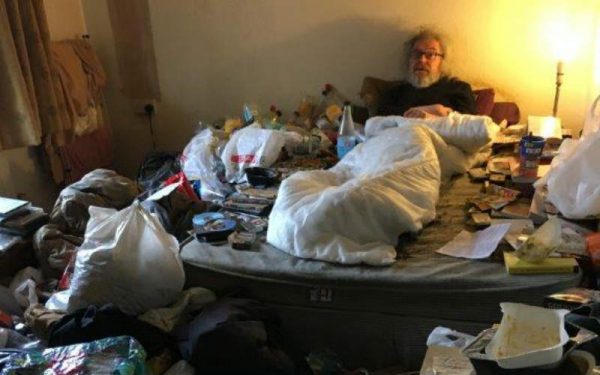Thinking outside the box: Get help with hoarding

Realising you’ve got a problem with hoarding is a great first step, but what on earth do you do next?
When it comes to mental health, we’re always told the most important thing is to talk about it.
That’s great advice, but if you ask someone you care about how they’re doing and they say they’re not OK, what the devil do you actually do about it? This terrifying little conundrum becomes even tougher when it’s a problem as little understood as hoarding.

In previous blogs we’ve looked at some of the myths around hoarding and how to spot the signs and symptoms. Today, we’re looking at practical steps you can take to help yourself and others.
What people think they should do
I reckon the top reaction to finding out someone has a problem with hoarding – and I’d have been guilty of this myself – would be to ride in on a white removals van with some marigolds and a few heavy-duty bin bags.
As well-intentioned as this might be, life isn’t actually like a Channel 4 documentary and this could actually end up doing more harm than good.
Plus, even if you do manage to clear the house it doesn’t tackle the root cause of the problem. Once the van doors are closed and the marigolds are off, the hoarder is left to go off and start the process all over again.
What you can actually do
As with any other mental health issue, patience and understanding is the most important thing.
I’m the first to admit this is easier said than done. If your mum hasn’t taken a shower in six months because she can’t get into her bathroom, or your neighbour is at risk of starting a fire or having a fall because of the piles of objects around their house, taking it slow is the last thing on your mind.
I can’t stress this enough though – supporting them to tackle the issue at their own pace is really important.

Put their mind at rest and let them know no one’s going to come barging in and throw everything out without their permission. Then encourage them to speak to a doctor, who can get them the support they need.
Getting professional help
There are a few ways to get help, and they’re all probably going to start with your GP.
Talking therapy is the most common treatment for hoarding, and CBT (cognitive behavioural therapy) usually has the most impact.
CBT is a type of therapy that focuses on how your thoughts, beliefs and attitudes affect your feelings and behaviour.
For example, a common thought you might have is ‘I can’t throw any of my daughter’s drawings out because she made them for me’. CBT teaches you to reframe that with a bit more perspective into something like ‘I already have a lot of pictures from her childhood and I haven’t got anywhere to store this’.
A therapist can help you look at why you feel the need to keep so many things, understand where that feeling comes from and then develop the skills to cope with them.
They might also suggest going on medication which, in essence, will help declutter your mind enough that you can think about decluttering your home. It just gives you the mental space to start on the road to recovery.
They might also give you ‘homework’ – and who doesn’t love homework? – with things to try out at home to help you take responsibility for managing your condition.
The aim is to slowly start throwing things away, which should help you realise nothing bad’s going to happen, and then start to get organised and plan for the future.
How we can help
We usually find out that one of our customers needs support with hoarding after their local neighbourhood specialist or scheme manager makes contact with them. They’ll then put them on to our fab hoarding team.
The team does an assessment to figure out whether the problem is actually hoarding related, and then works with them over a period of time to change their habits and thoughts.
They’ve even created an initiative called Outside the Box, which draws on CBT techniques to help break down the issue, set a plan and think about how to take back control.
We also get involved with local hoarding support groups, so there are different approaches to suit different people.
It can feel totally overwhelming, but if you’re struggling or you know someone who is, please get in touch.
Find out more about the support we can offer around hoarding or make a self-referral to our service


